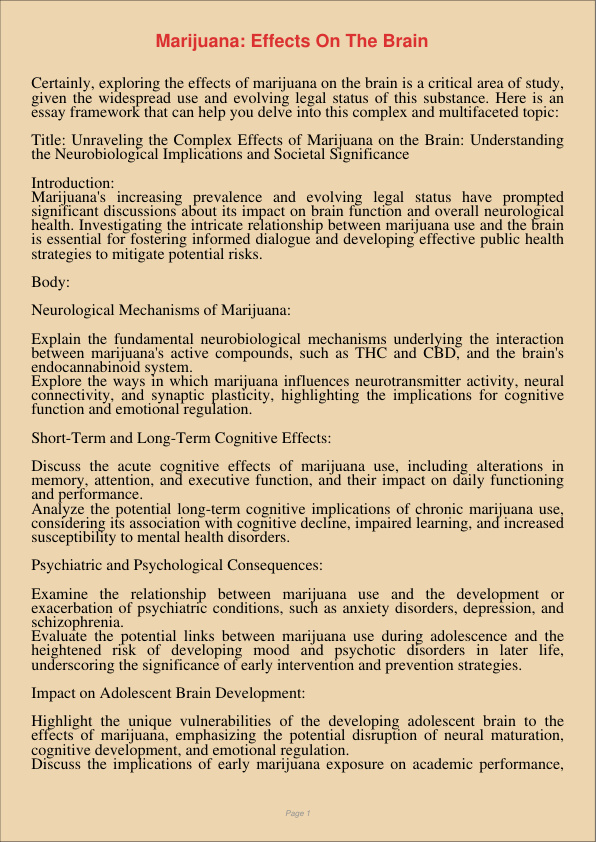Marijuana Effects On The Brain
Jan 12, 2024
marijuana
effects
Religion and Theology
Macro & Microeconomics
Certainly, exploring the effects of marijuana on the brain is a critical area of study, given the widespread use and evolving legal status of this substance. Here is an essay framework that can help you delve into this complex and multifaceted topic:
Title: Unraveling the Complex Effects of Marijuana on the Brain: Understanding the Neurobiological Implications and Societal Significance
Introduction: Marijuana’s increasing prevalence and evolving legal status have prompted significant discussions about its impact on brain function and overall neurological health. Investigating the intricate relationship between marijuana use and the brain is essential for fostering informed dialogue and developing effective public health strategies to mitigate potential risks.
Body:
Neurological Mechanisms of Marijuana:
Explain the fundamental neurobiological mechanisms underlying the interaction between marijuana’s active compounds, such as THC and CBD, and the brain’s endocannabinoid system. Explore the ways in which marijuana influences neurotransmitter activity, neural connectivity, and synaptic plasticity, highlighting the implications for cognitive function and emotional regulation.
Short-Term and Long-Term Cognitive Effects:
Discuss the acute cognitive effects of marijuana use, including alterations in memory, attention, and executive function, and their impact on daily functioning and performance. Analyze the potential long-term cognitive implications of chronic marijuana use, considering its association with cognitive decline, impaired learning, and increased susceptibility to mental health disorders.
Psychiatric and Psychological Consequences:
Examine the relationship between marijuana use and the development or exacerbation of psychiatric conditions, such as anxiety disorders, depression, and schizophrenia. Evaluate the potential links between marijuana use during adolescence and the heightened risk of developing mood and psychotic disorders in later life, underscoring the significance of early intervention and prevention strategies.
Impact on Adolescent Brain Development:
Highlight the unique vulnerabilities of the developing adolescent brain to the effects of marijuana, emphasizing the potential disruption of neural maturation, cognitive development, and emotional regulation. Discuss the implications of early marijuana exposure on academic performance, social behavior, and the long-term trajectory of brain health and functioning.
Public Health Implications and Policy Considerations:
Propose evidence-based strategies for educating the public about the potential risks of marijuana use on brain health, emphasizing the importance of targeted prevention programs and harm reduction initiatives. Advocate for the implementation of comprehensive regulatory measures and policies that prioritize informed consent, responsible use, and access to evidence-based treatment for individuals affected by marijuana-related neurological and psychiatric issues.
Conclusion: Understanding the intricate interplay between marijuana use and brain function is crucial for promoting informed decision-making and safeguarding public health. By addressing the neurological implications of marijuana use through comprehensive research, education, and policy initiatives, society can strive to foster responsible practices and mitigate potential risks associated with its consumption.
By utilizing this framework, you can develop a comprehensive essay that delves into the effects of marijuana on the brain, incorporating scientific evidence, clinical research, and expert insights to underscore the significance and complexity of this critical public health issue.
